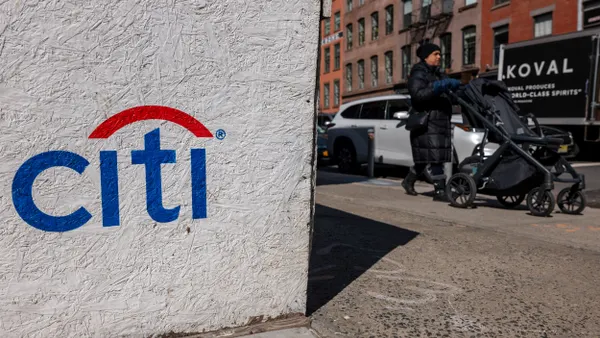Dive Brief:
- Bank of America and Citi have joined the Partnership for Carbon Accounting Financials (PCAF), a consortium that intends to standardize the way banks measure and reduce their climate impact, the banks announced separately Wednesday.
- Citi also pledged $250 billion over the next five years to finance and facilitate low-carbon solutions in the areas of renewable energy, clean technology, water quality and conservation, sustainable transportation, green buildings, energy efficiency, and sustainable agriculture and land use.
- The moves come little more than a week after Morgan Stanley became the first large U.S. bank to join PCAF, a Dutch group that now counts 70 members accounting for more than $9 trillion in assets.
Dive Insight:
Citi's $250 billion pledge builds on a 10-year, $100 billion environmental finance initiative the nation’s third-largest bank launched in 2014. Last July, the bank announced it was on track to surpass that threshold four years ahead of schedule. Indeed, Citi said Wednesday it had financed $164 billion in that effort.
Citi said it will test its lending portfolios for transition risks and physical risks against scenarios that assume global warming of 1.5 and 2 degrees Celsius.
The bank also said it intends to reduce its CO2 emissions by 45% by 2025 and source 100% renewable electricity across its global footprint by the end of 2020.
"If there's one lesson to be learned from the COVID-19 pandemic, it is that our economic and physical health and resilience, our environment and our social stability are inextricably linked," Michael Corbat, Citi's CEO, said in a press release Wednesday. "[Environmental, social and governance goals have] been front and center in Citi's response to this health crisis, and evermore present in conversations with clients and partners."
In joining PCAF, Bank of America and Citi become the group's largest members, by asset — and its most prolific polluters, according to a study released in March by the Rainforest Action Network. Between 2016 and 2019, Citi was the world’s third-highest lender to fossil-fuel companies, with $187.7 billion. Bank of America ranked fourth, with $156.9 billion.
"As a global financial institution, and as an industry, we have a critical role to play in accelerating the transition to a low-carbon, more sustainable economy," Anne Finucane, vice chairman at Bank of America, said Wednesday in a press release. "By joining PCAF, we are helping to drive a consistent framework for institutions to measure financed emissions, as well as providing a useful tool in the management of these emissions."
Val Smith, Citi’s chief sustainability officer, said she expects more banks will join PCAF in the near future. "This really does need to be a collaborative effort," she told American Banker.
PCAF is looking to align banks' business models with the U.N.'s Paris Agreement on Climate Change. Citi last year became the first major U.S. bank to sign on to that initiative.
U.S.-based banks have taken several steps over the past few months to boost their green profile. Goldman Sachs in December laid out a 10-year goal to commit $750 billion in loans, underwriting, advisory services and investments toward companies and projects focused on renewable energy, sustainable transportation and affordable education.
Citi pledged in April to stop providing financial services to thermal coal-mining companies by 2030. Wells Fargo has increased its investment in solar energy.













